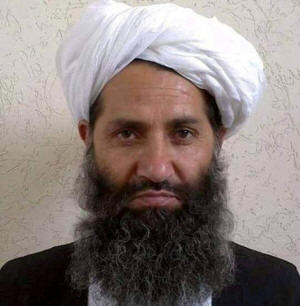Taliban leader hails Afghan victory at gathering to forge national unity
 Send a link to a friend
Send a link to a friend
 [July 01, 2022]
By Charlotte Greenfield and Mohammad Yunus Yawar [July 01, 2022]
By Charlotte Greenfield and Mohammad Yunus Yawar
KABUL (Reuters) -The reclusive supreme
leader of the Afghan Taliban, Haibatullah Akhundzada, hailed the
Islamists 2021 takeover of Afghanistan during a meeting on Friday called
to forge national unity and attended by religious leaders from around
the country.
Taliban spokesmen confirmed that Akhundzada, who is based in the
southern city of Kandahar, had come to the capital Kabul for the
all-male gathering of some 3,000 participants.
After receiving pledges of allegiance from participants raising their
hands, Akhundzada praised the Taliban's victory last August, which
marked the end of a 20-year struggle to overthrow a western-backed
government and drive U.S.-led forces out of the country.
"The success of the Afghan jihad is not only a source of pride for
Afghans but also for Muslims all over the world," he said according to
state-run Bakhtar News Agency, using the Arabic word signifying a
spiritual struggle.
When the Islamist movement unveiled its interim government in September,
the mysterious Akhundzada retained the role he has held since 2016 of
supreme leader, the group's ultimate authority, but he is rarely seen
publicly.
His address to the gathering of religious leaders comes a week after a
deadly earthquake hit eastern Afghanistan, and exposed the lack of
support the Taliban can count on from the international community.

The Afghan economy has plunged into crisis, as Western governments have
withdrawn funding and strictly enforced sanctions, saying that the
Taliban government needs to change course on human and women's rights.
In Thursday's speech, Akhundzada asked traders to return and invest in
the country, saying overseas aid could not build the economy and would
make Afghans more dependent on foreign money.
"Thank God, we are now an independent country. (Foreigners) should not
give us their orders, it is our system and we have our own decisions,"
he said according to Bakhtar.
"We have a relationship of devotion to one God, we cannot accept the
orders of others who God does not like," he said.
He said the group wanted peace and security and that neighbouring
nations had nothing to fear.
[to top of second column]
|

Taliban new leader Mullah Haibatullah Akhundzada is seen in an
undated photograph, posted on a Taliban twitter feed on May 25,
2016, and identified separately by several Taliban officials, who
declined be named. Social Media/File Photo

The Kabul gathering began on Thursday under tight
security.
At one point, sustained gunfire erupted near the venue, which
Taliban spokesmen said was the result of security men firing at a
"suspicious location", and the situation was under control.
At least one participant had called for girls' high schools to be
opened but it was unclear how widespread support was for that
proposal.
Deputy Taliban chief and acting interior minister Sirajuddin Haqqani
addressed the meeting on Friday, saying the world was demanding
inclusive government and education, and the issues needed time.
"This gathering is about trust, interaction, we are here to make our
future according to Islam and to national interests," he said.
The Taliban went back on an announcement that all schools would open
in March, leaving many girls who had turned up at their high schools
in tears and drawing criticism from Western governments.
Taliban spokesman Zabihullah Mujahid said that they would respect
the decisions of those at the meeting but the final say on girls'
education was up to the supreme leader.
A hardline cleric whose son was a suicide bomber, Akhundzada has
spent most of his leadership in the shadows, letting others take the
lead in negotiations that ultimately saw the United States and their
allies leave Afghanistan last August after 20 years of fighting a
grinding counter-insurgency war.
(Reporting by Charlotte Greenfield and Mohammad Yunus Yawar in
Kabul; Editing by Robert Birsel, William Maclean & Simon
Cameron-Moore)
[© 2022 Thomson Reuters. All rights
reserved.]
This material may not be published,
broadcast, rewritten or redistributed.
Thompson Reuters is solely responsible for this content.
 |